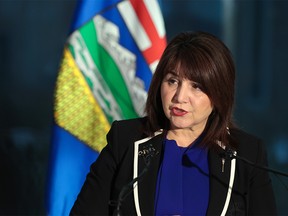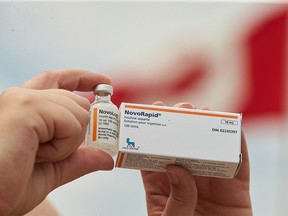
‘It’s almost this is the gut reflex of the current government, that whatever the proposal is out of Ottawa, the answer is no,’ said political scientist Duane Bratt

Article content
Alberta will pull out of a federal pharmacare plan if Ottawa pursues the initiative, health minister Adriana LaGrange announced at a virtual news conference late Monday, citing existing subsidy programs and a lack of consultation by the federal government as reasons for the ministry’s decision.
The Liberals and NDP on Friday reached a deal on a new plan that covers the costs of diabetes and contraceptive medication — billed as a first step to a wider coverage for Canadians across the country. The two parties have agreed to pass legislation with a framework for the program by March 1.
Advertisement 2
Article content
Article content
But the UCP government has denounced the plan even before its details are released, calling it “a hastily arranged, politically motivated program that the Liberal government has agreed to, in an attempt to hold together their confidence and supply agreements with the NDP to avoid an election.”
LaGrange said the province is asking for per capita funding from the federal government for its existing subsidy programs.
The province wasn’t consulted on this initiative, the minister said, while “limitations in the initial analysis and assumptions, including startup investment and administrative costs to implement a cost-sharing model,” could raise the costs of implementing the federal program.
Recommended from Editorial
However, Mount Royal University political analyst Duane Bratt believes the decision is premature.
“They haven’t even seen the details of the program, they’re already saying no,” Bratt said. “It’s almost this is the gut reflex of the current government, that whatever the proposal is out of Ottawa, the answer is no.”
Article content
Advertisement 3
Article content
He also finds the ministry’s demand for additional federal funding without a commitment to implement the pharmacare plan to be a “non-starter.”
Speaking about the province’s existing subsidy programs for accessing drugs, he said, “That’s the case in every province, but there are gaps in that coverage. Maybe pursuing a federal plan isn’t the right idea, but I would have thought that they should have at least waited for the details to come out before walking away.”
Some medications inaccessible due to costs, qualifications
Meaghon Reid, executive director of Vibrant Communities — a non-profit studying solutions for poverty across Calgary — finds the pharmacare program a promising solution for mitigating the inaccessibility of drugs.
“I think it caused a lot of excitement in the community that those are now free,” Reid said.
“There are a lot of great programs in Alberta that help with reducing the cost of drugs. But in a lot of cases, they still require the patient to co-pay. Even if it’s minor, that’s still pretty inaccessible for a lot of people.”

Among provincial subsidies, the main initiative is the Alberta Adult Health Benefit program, which covers the cost of ambulance services, a list of prescription drugs and dental and eye care.
Advertisement 4
Article content
Meanwhile, to qualify for the subsidy, an individual must “have high ongoing prescription drug needs” and their household income of four must be lower than $37,000. The impediment has left many with slightly higher incomes but who are unable to afford their medication ineligible to access the program.
The province also subsidizes the premium of an Alberta Blue Cross insurance plan for people who aren’t insured by their employer. However, the discount is applied to households with incomes lower than $39,250. And those on the program still have to shoulder 30 per cent of the prescription cost, to a maximum of $25 for each drug prescribed.
The barriers have caused some to skip their medication altogether. Many Calgarians with lower incomes suffering from severe illnesses had to choose between covering basic expenses over medications, found a 2021 report by the city and other non-profits, including U of C.
Federal plan could help many Canadians
The pharmacare plan only covers contraceptives and diabetes medication, but a PhD candidate in epidemiology wrote in an article for Conversation Canada that even a limited version of the program can help many Canadians while improving gender equity and child health.
Advertisement 5
Article content
Some contraceptives such as IUDs can cost up to $550. The program can encourage people with lower incomes, who rarely take such medication, to access the drugs and prevent unintended pregnancies — which are associated with adverse maternal and infant outcomes, including depression, preterm birth and low infant birthweight, the author wrote.

Meanwhile, free medication for patients with diabetes could fill numerous gaps that many have to navigate. The program could potentially save a typical patient with type 2 diabetes nearly $2,000 a year and $1,100 if they’re on a subsidized Blue Cross Non-Group Insurance plan, said Dr. David Campbell, associate professor and consultant endocrinologist at the University of Calgary.
He also found that those unable to afford their diabetes medication have a hospitalization rate that is 55 per cent higher than those who don’t face such barriers, while in-patient costs of tending to the former are 37 per cent greater than the latter.
“There’s an economic argument to be made here as well, that if we cover people’s preventive medication, it may not actually end up costing us more because we’re paying for those people when they have acute complications and end up in hospital,” Campbell said.
Article content

